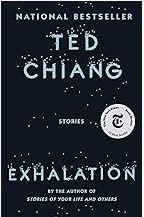Exhalation (short story review)
An anatomist investigates what is happening to his world that is powered by air.
Exhalation is the second story of the 2019 story collection Exhalation:Stories by Ted Chiang. It builds a limited world and quickly takes the reader into some detailed aspects of the environment and its people. The story won the 2009 Hugo award for Best Short Story and the 2009 British Science Fiction Association (BSFA) award for Best Short Fiction.
The Setting
The anatomist narrator opens the tale talking about consuming two ”lungs” of air each day to live on. The social environment exists mainly around the air refilling stations where residents go to get their air. A great lung under the ground is the single source of air and everyone knows their air comes from the same place. Because of this shared, single source, everyone sees themselves as equal to others and this creates a camaraderie in the population.
The anatomist also mentions that he's been to the edge of the world where chromium walls extend up to infinity. The comment almost seems like a throwaway observation, but it becomes relevant later in the story.
The Culture
In this world, the first day of every year is marked by a crier reciting an ode that has been passed down through time. The crier always finishes the ode just as the clock strikes the hour. This year was different though.
Multiple criers claim the clock struck the hour before they finished even though investigation has shown the clocks are all in perfect working order. The anatomist believes that happening once or twice could be coincidence. However, he’s heard of three separate instances and is sure it has an external, discoverable cause.
The anatomist relates science’s theories about death and is currently studying the brain to verify such theories. He goes into detail about what happens to the brain when someone dies. No one has ever been able to study a deceased person’s brain because, if the head is suddenly cracked open, the brain turns to fine gold dust. If the head is opened carefully, the gold filaments that contained the memory are zeroed out.
Theories about the the air, the world, and why dead people are so hard to study are put forth in the story. This is all tied together by revelations the narrator comes to when he operates on his own brain.
Impressions
There's no dialogue in the story, and it's told as if the narrator is talking directly to the reader. As a result, the story is actually pretty easy to read even though it's full of complex ideas. Each bit of information is presented as something the narrator is excited about and fascinated by, yet there is a melancholy to his delivery because he's dealing with what he believes is an existential problem. That can be seen in this line:
Contemplate the marvel that is existence, and rejoice that you are able to do so.
There's enough in this 20 page story to entertain and make one feel what the narrator is going through. I give it 4 out of 5 stars, mainly because of how interesting the world was even though Chiang only gave exactly the amount of detail needed to understand what was happening.




